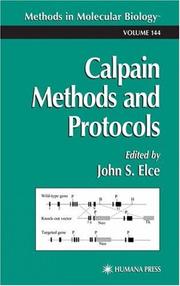| Listing 1 - 10 of 66 | << page >> |
Sort by
|
Book
ISBN: 3110846837 Year: 2019 Publisher: Berlin ; Boston : De Gruyter,
Abstract | Keywords | Export | Availability | Bookmark
 Loading...
Loading...Choose an application
- Reference Manager
- EndNote
- RefWorks (Direct export to RefWorks)

ISBN: 089925263X 3110107244 Year: 1986 Publisher: Berlin De Gruyter
Abstract | Keywords | Export | Availability | Bookmark
 Loading...
Loading...Choose an application
- Reference Manager
- EndNote
- RefWorks (Direct export to RefWorks)
Cysteine proteinases --- Cysteine proteinases --- Cysteine --- Endopeptidases --- Protease Inhibitors --- Congresses --- Inhibitors --- Congresses --- antagonists & inhibitors

ISBN: 0896036324 9786610820429 128082042X 1592590500 Year: 2000 Publisher: Totowa, NJ : Humana Press : Imprint: Humana,
Abstract | Keywords | Export | Availability | Bookmark
 Loading...
Loading...Choose an application
- Reference Manager
- EndNote
- RefWorks (Direct export to RefWorks)
In Calpain Methods and Protocols, John S. Elce and a seasoned team of principal investigators present a set of proven and easily followed protocols for studying calpain. The methods include in vitro techniques for the detection, expression, purification, and assay of µ- and m-calpain, supplemented with a wide range of system and tissue models for studying both the physiological functions and the effects of inhibitors on calpain. The systems used include neural tissue, kidney, liver, the eye, and membrane fusion in muscle and erythrocytes, each in connection with hypoxia or other injury. Among the analytical techniques employed are casein zymography, immunofluorescence, and calpain activity assays. The authors also examine specific substrates that have been proposed for the calpains. Highly practical and readily repeatable, Calpain Methods and Protocols offers investigators involved in basic and clinically oriented calpain research a gold-standard collection of powerful experimental tools for discovering the nature and function of calpains.
Calpain --- Cysteine proteinases. --- Proteinase --- Calcium-dependent cysteine proteinase --- Cysteine proteinases --- Neurosciences. --- Neural sciences --- Neurological sciences --- Neuroscience --- Medical sciences --- Nervous system
Book
ISBN: 1620815478 9781612093437 1612093434 9781620815472 9781620815472 Year: 2011 Publisher: New York
Abstract | Keywords | Export | Availability | Bookmark
 Loading...
Loading...Choose an application
- Reference Manager
- EndNote
- RefWorks (Direct export to RefWorks)
Cystatins. --- Cysteine proteinases --- Cystatin superfamily --- Proteins --- Inhibitors. --- Inhibitors

ISBN: 0890045151 Year: 1980 Volume: 6 Publisher: New York
Abstract | Keywords | Export | Availability | Bookmark
 Loading...
Loading...Choose an application
- Reference Manager
- EndNote
- RefWorks (Direct export to RefWorks)
Enzymology --- Oncology. Neoplasms --- Endopeptidases --- Neoplasm Invasiveness --- Metastasis --- Proteinase --- Cancer invasiveness --- Métastases --- Cancer --- Caractère envahissant --- Lymphatic Metastasis. --- Cysteine Proteases. --- Endopeptidases. --- Peptide Peptidohydrolases --- Cysteine Protease --- Cysteine Proteinase --- Cysteine Proteinases --- Protease, Cysteine --- Proteases, Cysteine --- Proteinase, Cysteine --- Proteinases, Cysteine --- Lymphatic Metastases --- Metastases, Lymphatic --- Metastasis, Lymphatic --- Sentinel Lymph Node --- Sentinel Lymph Node Biopsy --- diagnosis. --- Conferences - Meetings --- Métastases --- Caractère envahissant --- Cysteine Proteases --- Lymphatic Metastasis --- Proteolytic enzymes --- Dissemination of cancer --- Invasiveness (Oncology) --- Neoplasm invasiveness --- Spread of cancer --- Tumor dissemination --- Tumor invasiveness --- Tumor progression --- Tumor spread --- Cancer cells --- Congresses --- diagnosis --- Growth --- Lymph Node Metastasis --- Lymph Node Metastases --- Metastasis, Lymph Node --- Endopeptidase

ISBN: 0121821455 9780121821456 Year: 1994 Volume: 244 Publisher: San Diego Academic Press
Abstract | Keywords | Export | Availability | Bookmark
 Loading...
Loading...Choose an application
- Reference Manager
- EndNote
- RefWorks (Direct export to RefWorks)
Biological techniques --- Enzymes protéolytiques --- Peptide hydrolases --- Peptidohydrolases --- Proteases --- Proteolytic enzymes --- Proteolytiques [Enzymes ] --- Proteolytische enzymen --- Peptidases --- Cysteine endopeptidases --- Serine proteinases --- Cysteine Endopeptidases. --- Serine Proteases.
Dissertation
Year: 2001
Abstract | Keywords | Export | Availability | Bookmark
 Loading...
Loading...Choose an application
- Reference Manager
- EndNote
- RefWorks (Direct export to RefWorks)
Bifidobacterium --- Bifidobacterium --- Culture techniques --- Culture techniques --- culture media --- culture media --- Ascorbic acid --- Ascorbic acid --- Production --- Production --- Whey --- Whey --- Chlorydrate de cysteine --- Chlorydrate de cysteine
Book

Year: 2016 Publisher: Frontiers Media SA
Abstract | Keywords | Export | Availability | Bookmark
 Loading...
Loading...Choose an application
- Reference Manager
- EndNote
- RefWorks (Direct export to RefWorks)
Growing plants have a constitutive demand for sulfur to synthesize proteins, sulfolipids and other essential sulfur containing molecules for growth and development. The uptake and subsequent distribution of sulfate is regulated in response to demand and environmental cues. The importance of sulfate for plant growth and vigor and hence crop yield and nutritional quality for human and animal diets has been clearly recognized. The acquisition of sulfur by plants, however, has become an increasingly important concern for the agriculture due to the decreasing S-emissions from industrial sources and the consequent limitation of inputs from atmospheric deposition. Molecular characterization involving transcriptomics, proteomics and metabolomics in Arabidopsis thaliana as well as in major crops revealed that sulfate uptake, distribution and assimilation are finely regulated depending on sulfur status and demand, and that these regulatory networks are integrated with cell cycle, photosynthesis, carbohydrate metabolism, hormonal signaling, uptake and assimilation of other nutrients, etc., to enable plant growth, development, and reproduction even under different biotic and abiotic stresses. This knowledge can be used to underpin approaches to enhance plant growth and nutritional quality of major food crops around the world. Although considerable progress has been made regarding the central role of sulfur metabolism in plant growth, development and stress response, several frontiers need to be explored to reveal the mechanisms of the cross-talk between sulfur metabolism and these processes. In this research topic the knowledge on plant sulfur metabolism is reviewed and updated. Focus is put not only on molecular mechanisms of control of sulfur metabolism but also on its integration with other vital metabolic events. The topic covers 4 major areas of sulfur research: sulfate uptake, assimilation and metabolism, regulation, and role in stress response. We hope that the topic will promote interaction between researchers with different expertise and thus contribute to a more integrative approach to study sulfur metabolism in plants.
sulfate deficiency --- Sulfate assimilation --- Glucosinolates --- Sulfur --- sulfate uptake --- Adenosine Phosphosulfate --- Cysteine synthesis --- Glutathione --- sulfate deficiency --- Sulfate assimilation --- Glucosinolates --- Sulfur --- sulfate uptake --- Adenosine Phosphosulfate --- Cysteine synthesis --- Glutathione
Book

Year: 2016 Publisher: Frontiers Media SA
Abstract | Keywords | Export | Availability | Bookmark
 Loading...
Loading...Choose an application
- Reference Manager
- EndNote
- RefWorks (Direct export to RefWorks)
Growing plants have a constitutive demand for sulfur to synthesize proteins, sulfolipids and other essential sulfur containing molecules for growth and development. The uptake and subsequent distribution of sulfate is regulated in response to demand and environmental cues. The importance of sulfate for plant growth and vigor and hence crop yield and nutritional quality for human and animal diets has been clearly recognized. The acquisition of sulfur by plants, however, has become an increasingly important concern for the agriculture due to the decreasing S-emissions from industrial sources and the consequent limitation of inputs from atmospheric deposition. Molecular characterization involving transcriptomics, proteomics and metabolomics in Arabidopsis thaliana as well as in major crops revealed that sulfate uptake, distribution and assimilation are finely regulated depending on sulfur status and demand, and that these regulatory networks are integrated with cell cycle, photosynthesis, carbohydrate metabolism, hormonal signaling, uptake and assimilation of other nutrients, etc., to enable plant growth, development, and reproduction even under different biotic and abiotic stresses. This knowledge can be used to underpin approaches to enhance plant growth and nutritional quality of major food crops around the world. Although considerable progress has been made regarding the central role of sulfur metabolism in plant growth, development and stress response, several frontiers need to be explored to reveal the mechanisms of the cross-talk between sulfur metabolism and these processes. In this research topic the knowledge on plant sulfur metabolism is reviewed and updated. Focus is put not only on molecular mechanisms of control of sulfur metabolism but also on its integration with other vital metabolic events. The topic covers 4 major areas of sulfur research: sulfate uptake, assimilation and metabolism, regulation, and role in stress response. We hope that the topic will promote interaction between researchers with different expertise and thus contribute to a more integrative approach to study sulfur metabolism in plants.
sulfate deficiency --- Sulfate assimilation --- Glucosinolates --- Sulfur --- sulfate uptake --- Adenosine Phosphosulfate --- Cysteine synthesis --- Glutathione
Book

Year: 2016 Publisher: Frontiers Media SA
Abstract | Keywords | Export | Availability | Bookmark
 Loading...
Loading...Choose an application
- Reference Manager
- EndNote
- RefWorks (Direct export to RefWorks)
Growing plants have a constitutive demand for sulfur to synthesize proteins, sulfolipids and other essential sulfur containing molecules for growth and development. The uptake and subsequent distribution of sulfate is regulated in response to demand and environmental cues. The importance of sulfate for plant growth and vigor and hence crop yield and nutritional quality for human and animal diets has been clearly recognized. The acquisition of sulfur by plants, however, has become an increasingly important concern for the agriculture due to the decreasing S-emissions from industrial sources and the consequent limitation of inputs from atmospheric deposition. Molecular characterization involving transcriptomics, proteomics and metabolomics in Arabidopsis thaliana as well as in major crops revealed that sulfate uptake, distribution and assimilation are finely regulated depending on sulfur status and demand, and that these regulatory networks are integrated with cell cycle, photosynthesis, carbohydrate metabolism, hormonal signaling, uptake and assimilation of other nutrients, etc., to enable plant growth, development, and reproduction even under different biotic and abiotic stresses. This knowledge can be used to underpin approaches to enhance plant growth and nutritional quality of major food crops around the world. Although considerable progress has been made regarding the central role of sulfur metabolism in plant growth, development and stress response, several frontiers need to be explored to reveal the mechanisms of the cross-talk between sulfur metabolism and these processes. In this research topic the knowledge on plant sulfur metabolism is reviewed and updated. Focus is put not only on molecular mechanisms of control of sulfur metabolism but also on its integration with other vital metabolic events. The topic covers 4 major areas of sulfur research: sulfate uptake, assimilation and metabolism, regulation, and role in stress response. We hope that the topic will promote interaction between researchers with different expertise and thus contribute to a more integrative approach to study sulfur metabolism in plants.
sulfate deficiency --- Sulfate assimilation --- Glucosinolates --- Sulfur --- sulfate uptake --- Adenosine Phosphosulfate --- Cysteine synthesis --- Glutathione
| Listing 1 - 10 of 66 | << page >> |
Sort by
|

 Search
Search Feedback
Feedback About UniCat
About UniCat  Help
Help News
News